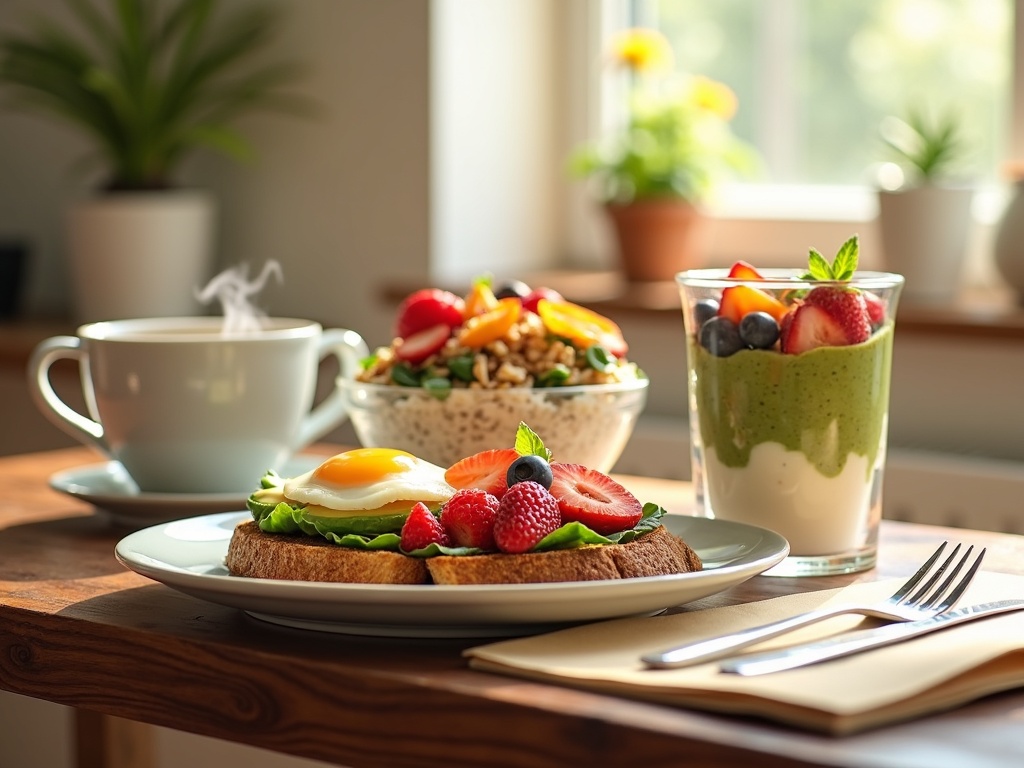I start my day with a nutritious Healthy breakfast which boosts my cognitive function by a full 20% while giving me lasting energy for peak brain performance all morning. People who eat breakfast regularly show improved mental alertness and face lower risks of diabetes and obesity. Adding protein-rich foods to my morning meal cuts my daily calorie intake by 400-500 calories, making breakfast a smart approach for weight control and health.
Find In This Article
Key Takeaways
- A balanced breakfast with the ideal ratio of 40% carbohydrates, 30% protein, and 30% healthy fats provides optimal energy without mid-morning crashes.
- Eating breakfast within an hour of waking helps jumpstart metabolism, stabilize blood sugar, and prevent poor food choices later in the day.
- Protein-rich breakfast options like Greek yogurt, eggs, or plant-based alternatives increase satiety and support muscle maintenance with an ideal serving of 20-25g.
- Make-ahead options such as overnight oats, egg muffins, and smoothie packs provide nutritious solutions for busy mornings when time is limited.
- Including fruit at breakfast has been shown to reduce daily sugar cravings by 30%, supporting better eating habits throughout the day.
Why Your Brain and Body Need a Morning Meal
Starting your day with a nutritious breakfast isn’t just about satisfying hunger—it’s a vital strategy for optimal brain function and physical health. I’ve discovered that making time for this important meal sets the tone for better cognitive performance and improved overall wellbeing.
Mental Performance Boosters
The morning meal primes your brain for peak performance. Research shows that eating breakfast improves cognitive function by 20%, giving you a significant advantage when tackling complex tasks. I’ve noticed that on mornings when I fuel my body properly, my thinking becomes sharper and more focused.
People who eat breakfast consistently demonstrate higher levels of alertness and perform better on memory tasks compared to those who skip this meal. This makes perfect sense when you consider that your brain needs glucose to function properly after the overnight fast. A balanced morning meal with complex carbohydrates, like those found in Bircher muesli or savory oatmeal dishes, provides steady energy that supports brain function throughout the morning.
Physical Health Protection
Beyond brain benefits, breakfast plays a crucial role in protecting your physical health. Studies have revealed that skipping breakfast increases diabetes risk by 21%—a statistic that highlights the metabolic importance of morning nutrition.
Regular breakfast eaters also enjoy lower risks of obesity and cardiovascular disease. This protective effect likely stems from better appetite regulation throughout the day. When you eat a balanced morning meal, you’re less likely to overeat later or reach for unhealthy snacks when hunger strikes.
The protein content of your breakfast deserves special attention. Morning protein intake reduces daily calories by 400-500, making it an effective strategy for weight management. I recommend incorporating protein-rich foods like eggs, Greek yogurt, or plant-based options into your morning routine. Baked oats with added nuts or seeds offer a delicious way to include protein while satisfying your taste buds.
The quality of your breakfast matters just as much as eating it in the first place. Here are smart choices for maximum benefit:
- Complex carbohydrates (whole grains, fruits) for sustained energy
- Protein (eggs, yogurt, nuts) for satiety and muscle support
- Healthy fats (avocado, nut butters) for brain function
- Fiber-rich foods for digestive health and prolonged fullness
For busy mornings, preparing make-ahead options like French toast that can be reheated quickly or assembling a simple yogurt parfait can save time while still delivering nutrition. If you’re hosting a gathering, breakfast catering can provide nutritious options without the stress of preparation.
The timing of breakfast also impacts its effectiveness. Eating within an hour of waking helps jumpstart your metabolism and stabilize blood sugar levels. This early fuel prevents the energy crashes that often lead to poor food choices later in the day.
By prioritizing breakfast, you’re making a smart investment in both your immediate performance and long-term health. Your brain gets the energy it needs to function at its best, while your body receives the nutrients required for metabolic health and disease prevention.

Perfect Portions for a Power-Packed Healthy Breakfast
Starting my day with the right balance of nutrients keeps me energized and focused throughout the morning. I’ve found that following a specific ratio of macronutrients – 40% carbohydrates, 30% protein, and 30% fat – provides optimal energy without the mid-morning crash that can happen with less balanced meals.
Building Your Balanced Healthy Breakfast Plate
Creating a properly portioned breakfast doesn’t need to be complicated. I focus on incorporating specific amounts of each macronutrient group:
- Carbohydrates: Whole grains are my go-to choice. A single serving providing 15-20g of carbs gives me sustainable energy. This could be a slice of whole grain bread, half a cup of oatmeal, or a serving of overnight Bircher muesli which combines oats with nutritious add-ins.
- Protein: Protein is crucial for muscle maintenance and satiety. I aim for 20-25g from Greek yogurt in the morning, which keeps me full until lunch. Alternatively, eggs are excellent – with each egg providing about 6g of protein. For a complete protein serving, I might prepare three eggs as an ingredient in savory oatmeal or simply scrambled alongside whole grain toast.
- Healthy Fats: Healthy fats round out my breakfast with 5-7g per serving. Half an avocado sliced onto toast or a tablespoon of nut butter stirred into baked oats adds richness and helps with vitamin absorption.
Fiber is another key component I make sure to include. Adding a banana to my breakfast provides about 3g of fiber, while berries or other fruits can boost that even further. Vegetables aren’t traditionally associated with morning meals, but adding spinach to eggs or grated carrots to oatmeal increases fiber content significantly.
The beauty of this balanced approach is its flexibility. On days when I’m preparing French toast, I make sure to add protein with Greek yogurt on the side and healthy fats with a sprinkle of nuts. When hosting friends, this knowledge helps me create breakfast spreads that satisfy everyone while maintaining nutritional balance.
I’ve noticed significant improvements in my energy levels since adopting this portioning strategy. The combination of slow-releasing carbohydrates, satiating proteins, and essential fats prevents blood sugar spikes and keeps hunger at bay until lunchtime.
This approach works whether I’m enjoying a quick weekday breakfast or a leisurely weekend brunch. By keeping these ratios in mind, I can adapt almost any breakfast favorite to create a more nutritionally complete meal that fuels my body properly.
The key is consistency without rigidity. Some mornings might skew slightly higher in protein if I’ve planned an intense workout, while others might include more complex carbohydrates if I’m facing a particularly demanding day. This flexible framework allows for personalization while maintaining the core principles of balanced nutrition.
By thinking in terms of these proportions rather than strict calorie counts, I’ve made my morning routine both simpler and more nourishing. The right balance at breakfast sets a positive tone for my entire day’s eating habits and energy levels.
Quick and Easy Healthy Breakfast Winners
Finding time for a nutritious morning meal can be challenging. I’ve discovered several quick options that deliver both convenience and nutrition, perfect for busy mornings when I need fuel without fuss.
Protein-Packed Morning Starters
Overnight oats have become my go-to breakfast solution. I mix rolled oats with milk or yogurt, add a handful of berries rich in antioxidants, and sprinkle nuts for omega-3s. The beauty of this breakfast is that it requires just minutes of prep the night before, yet delivers sustained energy throughout the morning.
Greek yogurt parfaits offer another speedy solution with impressive nutritional benefits. By layering high-protein Greek yogurt with granola and fresh fruit, I create a fiber-rich breakfast that keeps hunger at bay until lunchtime. For variety, I sometimes swap traditional Bircher muesli for granola, which adds a delightful texture contrast.
Avocado toast has earned its popularity for good reason. I spread ripe avocado on whole grain bread and top it with a perfectly poached egg for a breakfast that combines healthy fats with protein. This combination delivers steady energy without the mid-morning crash I used to experience with sugary cereals.
Sippable Nutrition
Green smoothies offer complete nutrition in a glass when I’m truly pressed for time. My favorite blend includes spinach, banana, a scoop of protein powder, and almond milk. This nutrient-dense mix provides vitamins, minerals, and protein in a portable format perfect for hectic mornings.
I’ve found that baked oats can be prepared in batches on weekends, then reheated for a warm, comforting breakfast during busy weekdays. This versatile dish can be customized with different fruits and spices for variety throughout the week.
Including fruit with breakfast has transformed my eating habits. Studies show that eating fruits at breakfast reduces daily sugar cravings by 30%. I’ve experienced this firsthand, finding that starting my day with berries or banana makes me less likely to reach for sweets later.
For special occasions when I have guests but still want simplicity, I might prepare a French toast bar where everyone can customize their breakfast. This approach offers a middle ground between everyday efficiency and breakfast catering without the hassle.
These quick options have made my mornings smoother while ensuring I get the nutrition needed to start the day right.

Smart Solutions for Busy Mornings
Morning rush can make eating a healthy breakfast feel impossible. I’ve discovered some practical ways to fuel my body even on the busiest days. According to the CDC, only 34% of adults eat breakfast daily – a missed opportunity for better health and energy levels. With a bit of planning, you can join that breakfast-eating group without adding stress to your morning.
Make-Ahead Magic
I’ve found that preparation is key to maintaining healthy habits when time is tight. Bircher muesli and savory oatmeal variations make excellent options you can prepare the night before. Simply combine oats with milk or yogurt, add fruits, nuts, or seeds, and let them chill overnight. By morning, you’ll have a nutritious meal ready to grab from the fridge.
Egg muffins have changed my morning routine completely. I batch cook these protein-packed bites on weekends by whisking eggs with veggies, cheese, and herbs, then baking them in a muffin tin. They store beautifully in the fridge for up to four days, needing just a quick reheat in the microwave. For longer storage, you can freeze them and defrost as needed.
Smoothie packs save precious morning minutes while delivering nutrition. Here’s how I prepare them:
- Portion fruits, greens, and seeds into individual freezer bags
- Add protein powder or nut butter if desired
- In the morning, dump into a blender with liquid and blend
- Pour into a travel cup if you’re heading out the door
When even those options seem too time-consuming, I keep a well-stocked supply of grab-and-go items. Yogurt cups, nuts, fresh fruit, and hard-boiled eggs require zero preparation but still provide essential nutrients to start your day.
For special occasions or when hosting guests, breakfast catering can take the pressure off while still ensuring everyone enjoys a healthy meal. On weekends when time permits, I might treat myself to French toast or baked oats for a more leisurely morning experience.
Creating a breakfast routine doesn’t have to be complicated. By dedicating just a small amount of prep time each week, you can transform your mornings from rushed and hungry to nourished and energized.
Sources:
Journal of Nutrition – The Importance of Breakfast for Weight Control and Health
American Journal of Clinical Nutrition – The Association Between Breakfast Consumption and Cardiometabolic Health
Nutrition Reviews – Protein and Weight Management
Nutrients – The Role of Fruits and Vegetables in Weight Management
Centers for Disease Control and Prevention (CDC)

